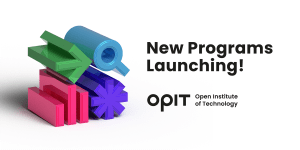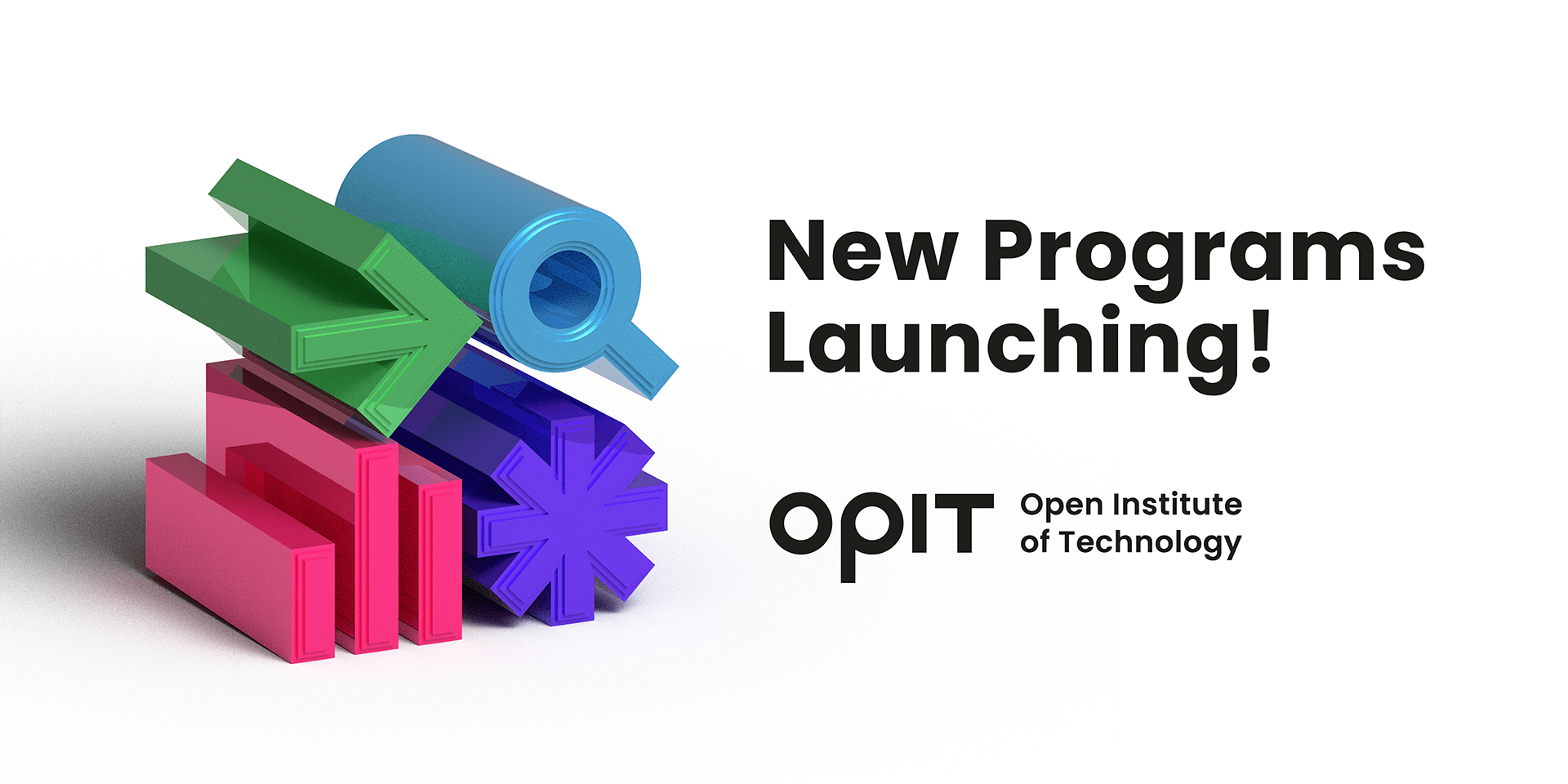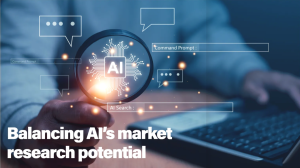

Soon, we will be launching four new Degrees for AY24-25 at OPIT – Open Institute of Technology
I want to offer a behind-the-scenes look at the Product Definition process that has shaped these upcoming programs.
🚀 Phase 1: Discovery (Late May – End of July)
Our journey began with intensive brainstorming sessions with OPIT’s Academic Board (Francesco Profumo, Lorenzo Livi, Alexiei Dingli, Andrea Pescino, Rosario Maccarrone) . We also conducted 50+ interviews with tech and digital entrepreneurs (both from startups and established firms), academics and students. Finally, we deep-dived into the “Future of Jobs 2023” report by the World Economic Forum and other valuable research.
🔍 Phase 2: Selection – Crafting Our Roadmap (July – August)
Our focus? Introducing new degrees addressing critical workforce shortages and upskilling/reskilling needs for the next 5-10 years, promising significant societal impact and a broad market reach.
Our decision? To channel our energies on full BScs and MScs, and steer away from shorter courses or corporate-focused offerings. This aligns perfectly with our core mission.
💡 Focus Areas Unveiled!
We’re thrilled to concentrate on pivotal fields like:
- Cybersecurity
- Advanced AI
- Digital Business
- Metaverse & Gaming
- Cloud Computing (less “glamorous”, but market demand is undeniable).
🎓 Phase 3: Definition – Shaping the Degrees (August – November)
With an expert in each of the above fields, and with the strong collaboration of our Academic Director, Prof. Lorenzo Livi , we embarked on a rigorous “drill-down process”. Our goal? To meld modern theoretical knowledge with cutting-edge competencies and skills. This phase included interviewing over 60+ top academics, industry professionals, and students and get valuable, program-specific, insights from our Marketing department.
🌟 Phase 4: Accreditation and Launch – The Final Stretch
We’re currently in the accreditation process, gearing up for the launch. The focus is now shifting towards marketing, working closely with Greta Maiocchi and her Marketing and Admissions team. Together, we’re translating our new academic offering into a compelling value proposition for the market.
Stay tuned for more updates!
Related posts

Source:
- EFMD Global, Published on July 12th, 2024.
By Stephanie Mullins
Many people love to read the stories of successful business school graduates to see what they’ve achieved using the lessons, insights and connections from the programmes they’ve studied. We speak to one alumnus, Riccardo Ocleppo, who studied at top business schools including London Business School (LBS) and INSEAD, about the education institution called OPIT which he created after business school.
Please introduce yourself and your career to date.
I am the founder of OPIT — Open Institute of Technology, a fully accredited Higher Education Institution (HEI) under the European Qualification Framework (EQF) by the MFHEA Authority. OPIT also partners with WES (World Education Services), a trusted non-profit providing verified education credential assessments (ECA) in the US and Canada for foreign degrees and certificates.
Prior to founding OPIT, I established Docsity, a global community boasting 15 million registered university students worldwide and partnerships with over 250 Universities and Business Schools. My academic background includes an MSc in Electronics from Politecnico di Torino and an MSc in Management from London Business School.
Why did you decide to create OPIT Open Institute of Technology?
Higher education has a profound impact on people’s futures. Through quality higher education, people can aspire to a better and more fulfilling future.
The mission behind OPIT is to democratise access to high-quality higher education in the fields that will be in high demand in the coming decades: Computer Science, Artificial Intelligence, Data Science, Cybersecurity, and Digital Innovation.
Since launching my first company in the education field, I’ve engaged with countless students, partnered with hundreds of universities, and collaborated with professors and companies. Through these interactions, I’ve observed a gap between traditional university curricula and the skills demanded by today’s job market, particularly in Computer Science and Technology.
I founded OPIT to bridge this gap by modernising education, making it affordable, and enhancing the digital learning experience. By collaborating with international professors and forging solid relationships with global companies, we are creating a dynamic online community and developing high-quality digital learning content. This approach ensures our students benefit from a flexible, cutting-edge, and stress-free learning environment.
Why do you think an education in tech is relevant in today’s business landscape?

As depicted by the World Economic Forum’s “Future of Jobs 2023” report, the demand for skilled tech professionals remains (and will remain) robust across industries, driven by the critical role of advanced technologies in business success.
Today’s companies require individuals who can innovate and execute complex solutions. A degree in fields like computer science, cybersecurity, data science, digital business or AI equips graduates with essential skills to thrive in this dynamic industry.
According to the International Monetary Fund (IMF), the global tech talent shortage will exceed 85 million workers by 2030. The Korn Ferry Institute warns that this gap could result in hundreds of billions in lost revenue across the US, Europe, and Asia.
To address this challenge, OPIT aims to democratise access to technology education. Our competency-based and applied approach, coupled with a flexible online learning experience, empowers students to progress at their own pace, demonstrating their skills as they advance.
Read the full article below:

Source:
- The European, Summer 2024 Edition, Page 24
With careful planning, ethical considerations, and ensuring human oversight is maintained, AI can have huge market research benefits, says Lorenzo Livi of the Open Institute of Technology.
By Lorenzo Livi
To market well, you need to get something interesting in front of those who are interested. That takes a lot of thinking, a lot of work, and a whole bunch of research. But what if the bulk of that thinking, work and research could be done for you? What would that mean for marketing as an industry, and market research specifically?
With the recent explosion of AI onto the world stage, big changes are coming in the marketing industry. But will AI be able to do market research as successfully? Simply, the answer is yes. A big, fat, resounding yes. In fact, AI has the potential to revolutionise market research.
Ensuring that people have a clear understanding of what exactly AI is is crucial, given its seismic effect on our world. Common questions that even occur amongst people at the forefront of marketing, such as, “Who invented AI?” or, “Where is the main AI system located?” highlight a widespread misunderstanding about the nature of AI.
As for the notion of a central “main thing” running AI, it’s essential to clarify that AI systems exist in various forms and locations. AI algorithms and models can run on individual computers, servers, or even specialized hardware designed for AI processing, commonly referred to as AI chips. These systems can be distributed across multiple locations, including data centres, cloud platforms, and edge devices. They can also be used anywhere, so long as you have a compatible device and an internet connection.
While the concept of AI may seem abstract or mysterious to some, it’s important to approach it with a clear understanding of its principles and applications. By promoting education and awareness about AI, we can dispel misconceptions and facilitate meaningful conversations about its role in society.
Read the full article below:
- The European, Pages 24 to 26.
Have questions?
Visit our FAQ page or get in touch with us!
Write us at +39 335 576 0263
Get in touch at hello@opit.com
Talk to one of our Study Advisors
We are international
We can speak in:
